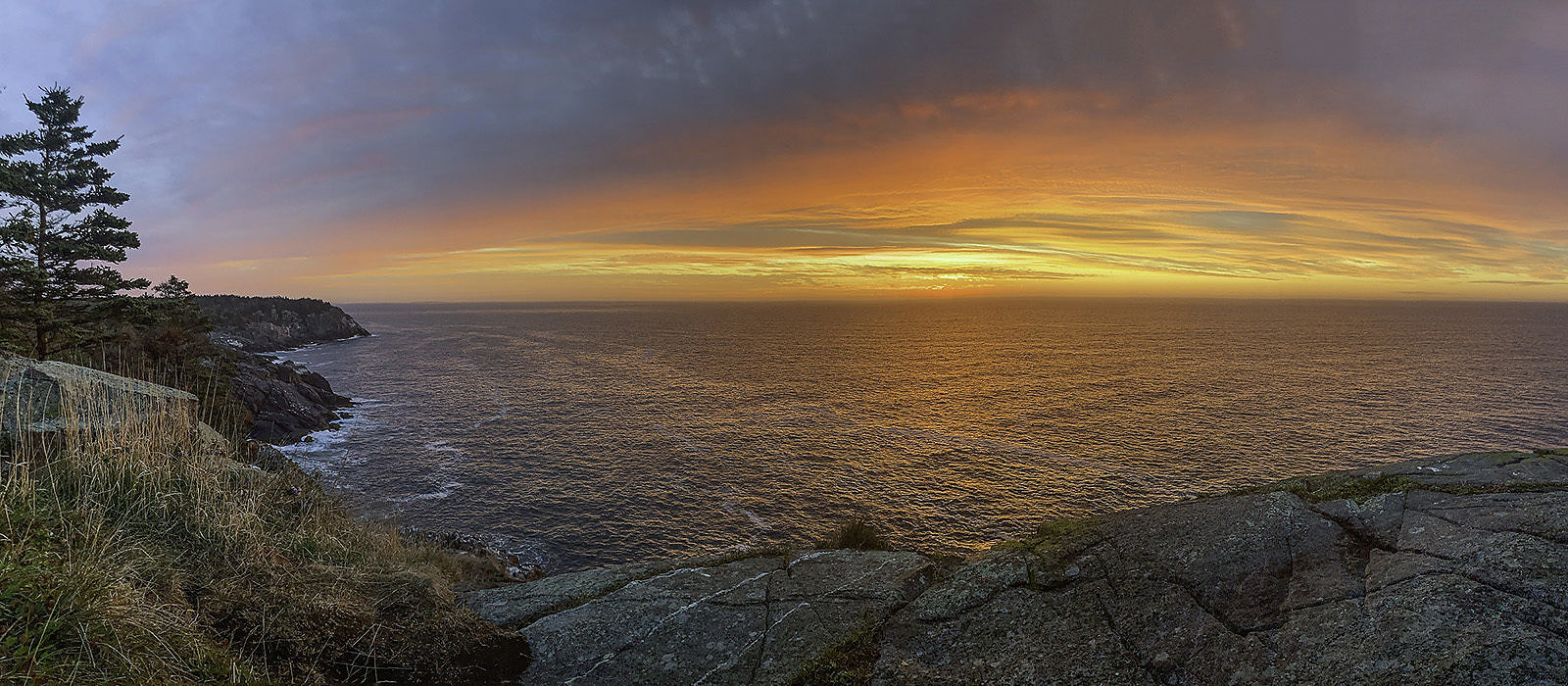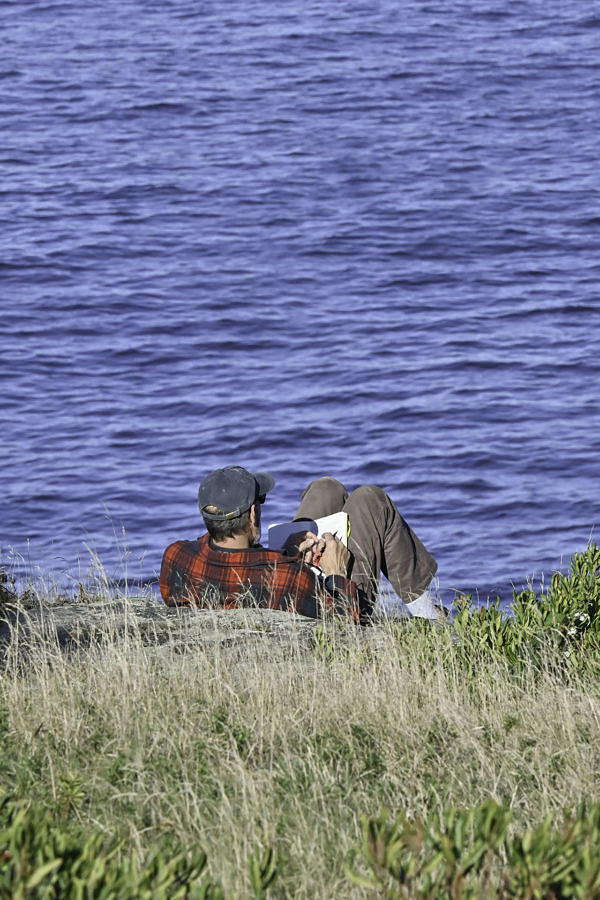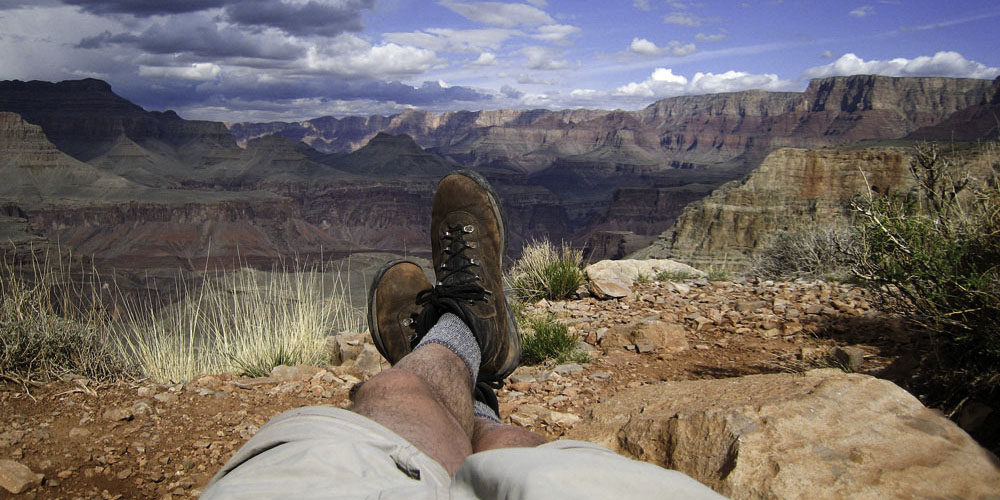
Walking, Limping, Sitting
What might Thoreau have thought of my knee replacement?
Image: Dawn on Monhegan Island, Maine – 7 Oct 2022
My 64-year-old right knee was reborn this autumn. And to get every last mile from the old joint before knee replacement surgery, I hobbled for two weeks around an island in the Gulf of Maine. While watching seals, whales, birds and wildflowers, I found time to draft an elegy to my decrepit knee and a philosophy of sorts about the privilege and virtues of walking — and of not walking.
Walking and reflection go well together, of course, and this essay is more personal than what I usually offer here on the blog or elsewhere. Nonetheless, the elegy and philosophy, which I hope resonate beyond my own knee, seem to converge on three ideas:
Because it’s there. On my old knee I was fortunate enough to have climbed Mt. Rainer (14,411 feet above sea level), sauntered to Rock Reef Pass (3 feet above sea level) in Everglades National Park, and reached countless altitudes in between. For work and play, I chased rare birds, insects and plants from treeless regions above the Arctic Circle to the tropical rainforests of Central America. Most this amounted to walking with ambition, determination and purpose. Lots of us move like this through life (whether or not we’re walking).
For no particular reason. On my knee I hiked, one foot in front of the other for a month, the length of my home state of Vermont between Canada and Massachusetts on the famed Long Trail — twice. I hiked through 1.5 billion years of geological time, rim to river to rim, in the Grand Canyon more times than I can recall. These are long walks of awareness. Carrying on your back only what is necessary, which isn’t much, you can know nature as you know our own body. You can smell when a moose is near. Or sense when the rain will come. Or discern an American Toad from a White-throated Sparrow from a Red Squirrel not by looking at them, but merely by the sound of their fussing in the leaf litter as you pass by. You walk, therefore you know.
Not walking. On my old knee, I sat a lot outside. I sat for hours with orchids. I sat with sparrows. I sat with elfin butterflies in deserts. I sat beside rivers. I sat in forests. I sat in prairies. And I sat in bogs, which are my most favorite places in the world to sit. This is an enduring way of being. Almost anywhere that I sit outdoors, I sit with purpose. Or without. Most times I’m not sure. But it doesn’t really matter. Slowing down is among the benefits of a bad knee.
Ten miles out to sea before surgery on Monhegan Island, Maine, seated on a high cliff most afternoons with my notebook and pencil, I got to know three Gray Seals and a pup frolicking in the froth and surf beating the headlands below me. One day one of the three, more sharply mottled on his throat and chest than the others, was floating on his back, gently kicking his tail flippers, his soft underbelly (if seals indeed have a soft underbelly) exposed and vulnerable to the world — or maybe instead trusting the world, open to its possibilities.
Being sedentary in nature is nothing if not replete with possibility. It might come in something as simple as the ocean’s taking deep, heaving breaths below you on a cliff. Or watching a sunset while holding the hand of the person you love more than living itself. Or sitting quietly alone beneath a tamarack in autumn, sanctified in its gentle rain of golden needles.
In these moments outdoors, any of us might discover, however fleeting, an absence of self or distraction, of worry or want. I suppose this is what Emerson and Thoreau and the other intellectuals meant by transcendence. To my mind, however, a better word for my own walking, limping, and in particular sitting in nature would be equanimity.
Maybe that kind of composure was what I had been seeking on Monhegan Island before the knee replacement, which, after all, is never a sure thing. I’ll admit that finding peace of mind was tough. Beyond my fear of surgery and pain, even failure of the whole endeavor, is not a total knee replacement another form of privilege and consumerism, which in large part are killing nature on the planet?
During my 64 years, I’ve used up a knee enjoying and working outdoors. Like too many products we use and throw away, a knee is now a first-world consumer good. Is not that kind of entitlement antithetical to equanimity? Is not sitting enough? I wonder what Thoreau might have thought about total knee replacement.
I have no easy answers, of course. Along with big brains and opposable thumbs, upright walking was an essential step in the evolution of what ultimately became Homo sapiens. And yet we need not walk in order to be human with lives of meaning.
Now, nearly three weeks after my surgery, I am gingerly walking a bit more each day on this new knee — an exercise in patience (and pain). From my backyard I envision new routes to come on life’s long, green path. And like that Gray Seal, open to possibility, I intend to spend many more of my days not walking — and simply sitting in nature with an open mind.
Postscript
An early draft of this dispatch featured Thoreau’s essay “Walking.” Not until I read it for the third and fourth time this autumn did I truly understand how much his essay is not about walking. Oh sure, Thoreau says wonderful things about the practice. “I think that I cannot preserve my health and spirits, unless I spend four hours a day at least—and it is commonly more than that—sauntering through the woods and over the hills and fields, absolutely free from all worldly engagements,” he writes.
Even so, in this manifesto of sorts, published in its entirety a month after his death in 1862, walking is more so a rhetorical device for Thoreau’s dissertation on civil society — a genuinely more perfect union, bound less to the state and to commerce than to justice and the natural world. With his views on slavery, the Mexican-American War, and imperialism already well established, in “Walking” Thoreau develops a utopian brand of Manifest Destiny (although he never uses the term). He writes amply of turning and walking westward, away from Europe and the offenses of the American East and South, toward the light, toward progress, to where the White Pine’s flowers, high on the tree, blossom “as well over the heads of Nature’s red children as of her white ones.”
In the metaphor of walking westward, and in actual nature, Thoreau, no fan of the state, nonetheless maintains his idealism and hope for a relatively new nation — and for lands and people beyond. “The West of which I speak is but another name for the Wild,” he writes, “and what I have been preparing to say is, that in Wildness is the preservation of the World.”
I only wish it had turned out better for the world and its people.



Great article!! Saw the link on Cypress Snowy Owl on Facebook! You should join our group! Roy Rausch is a great administrator and spoke highly of you
Thanks so much, Victoria. I’m wishing you healing as well!
Thank you, Bryan, for this meditation on the joys of walking, limping, and sitting, especially in nature. Even with a damaged back, I try to stay in gear. Having a dog helps. Good luck to you and Ruth as you push forward.
Inspired & more peaceful by your beautiful words & pictures … ankle bone fusion surgery coming up day after next.
It will be a long healing.
Thank you for this comforting vision of “sitting in nature” -just being @ home.
Heal well Bryan
Very kind of you. Thanks, Ann. You’ve made my day!
I enjoy your writing and photography so much
Thank you
… and we’re still learning to see! Thanks, John!
I’ll do my best, Barbara! 🙂
Thanks so much for the encouragement, Alberta. Very kind of you.
Wise words from another wise Chickering. One day, one step — indeed! Thanks, Sue. ❤️
Thanks, Ron! Best to you and Norma!
Yeah, my left knee is a bit creaky now — hoping to avoid this ordeal again. Hope your knees are workin’ out, Andrew!
You are so very welcome, Doreen. What a gift for me to share the nature and prose.
I do think you’re right (as usual), Bernie! Nice notion about ol’ Hank!
Oh, what a treat and surprise to see you on Monhegan. I’m so glad you’re back East (probably where you belong). Keep walking!
Thanks, “Woody” — you win the reader/editor prize. War reference fixed!
Thanks, Jo! So very kind of you. I suspect you’re as intrepid as ever!
Aw, shucks, Linda. Thanks so much. You’ve made my day. All my best to you and Nicola.
This is so kind of you, Sue. Very touching. (And even when we can’t walk far, at least the moths will come to us!) ❤️
Wow! Impressive! Prolotherapy, ales and fish & chips — can’t argue with success! Thanks, Steve. Onward!
I’m grateful as well, Martha, for adding some peace to your day and life. Gosh, what a reward! Thanks!
What fond memories, Marcia. We did see lots of life in flight together. I miss it!
Thanks, Pam. Can’t wait for another supper!
So nice to hear from you Kristina. (Gosh I miss suppers at the Wayside.) Yeah, I’ve been adapting for 7 years on this knee. Held out for as long as I could. (Walking on bogs was the best cure.) 🙂
Hooray for the PTs! My heros! Thanks, Alice!
Thank you, my friend. Yes, each age has a pace of its own, and here we are with much to look forward to even if we don’t know how long. I so appreciate your reminders of how much of life is left to see.
As always, I love reading your posts. Thanks for the update, and you will enjoy many more walks you can share with us.
Thank you for sharing your thoughts concerning your life changing knee replacement.
A member of my church had both hips replaced. They took time off from their church duties to recover from each surgery and learn how to walk with new hips. It was a life changing moment in time for the member.
Your writing indicates it was life changing for you to have the knee replacement with no guarantee that it would be successful. If everything works well after your healing process, you will continue to be free to do your own special trail blazing that I enjoy seeing and reading.
I pray that you will have a speedy recovery.
One day at a time, one step at a time. Transcendence, resilience, peace of mind whether still or in motion…thank you for sharing your insights and personal discoveries as you move forward on your new knee and in life each and every day. Heal well and quickly.
Beautiful thoughts, beautiful photos – as usual! Thanks, Bryan…
Congratulations on the new knee. I have enjoyed your writing/blogging; this piece resonated with me as I had both knees replaced this summer (one in May and the other in August).
Best wishes for a speedy recovery and to many future adventures to come! Until that time, reflection and contemplation on all the beauty you have witnessed will carry you. Thank you for sharing your gifts of nature and prose.
Bryan, I think that Thoreau would have applauded the effort it took you to NEED a new Knee!
Thanks for this, Bryan. As a guy so long obsessed with walking at least three miles a day in a particular nature preserve, it now occurs to me that I might should consider sitting for a moment from time to time. Was nice to see you on Monhegan—and congrats on the new knee joint!
After more than 70 years of wandering forest and field virtually daily for both work and pleasure the muscles and tendons of my feet and legs are wearing out (but surprisingly not my knees) so I do hope your bionic knee serves you well. Your writings always bring pleasure to those of us who read them — thank you. Just as an aside and not to embarrass you, Thoreau wouldn’t have had any thoughts on the Spanish-American War since it occurred long after his death; it was the Mexican War that he opposed.
I loved reading this – your writing is as calming as a walk in the woods can be, yet it holds my interest to the end. Thank you for sharing your thoughts and ideas, and may that new knee keep you moving. The winged and multi-legged creatures need you and the two-legged ones need your observations! Best wishes
I learn and feel so much with each of your posts. Thank you for being extremely generous with your devoted readers.❤️
As I read your words they make me reflect on so many memories of dear friends who struggled with the realities of life and yet continued to be a mentor.
You never know how significant you are when you share your view of life. It matters to me.
Thank you.
May the new knee force be with you Bryan! We walked Hadrians Wall in Great Britain in September — 90 miles from west to east — and did it in 8 days, sometimes 17 miles a day. A challenge for these 70-year-old knees and legs, but we survived. The pints of ale and lunches of fish and chips helped. My naturopath in Burlington says my meniscus on the right knee is failing so he’s been using prolotherapy treatments to stimulate meniscus growth. It works. Doubles tennis and walking most days now… Happy Walking!
Bryan, Your new knee will take you to places you never thought you would be again and when you are there I know you will look down and say “thank you new knee for allowing me to be here.” I have always felt such freedom when I walk in a calming forest listening to all the sounds of life it provides, particularly bird song, so something resonated with me reading your quote from Thoreau, “absolutely free from all worldly engagements”. Thank you for sharing your personal thoughts and life experiences expressed in such a way that brings peace to my day and to my life.
As I limp along with my cane and occasional walker at age 88, I think back on the many birding adventures you led over the years, with your many acolytes following and learning. Thanks for your patience over the years, with your keen eyes and ears teaching, always teaching. Heal well and quickly.
Bryan! Thank you for this beautiful reflection on nature and knees. I’m getting more and more committed to preserving my health in order to keep being outdoors. I appreciate this dose of wisdom. Sending my very best to you.
This is an interesting reflection on the trend toward joint replacement. I’ve never heard anyone else put forward these types of questions, so, as usual Bryan: Thank you! I thought my knees were shot a few years ago, and was invited to pick a cane from our friend John O.’s cane collection. I struggled & endured a lot of pain, to keep up with my outdoor work. However in the end, I believe it is exactly that same gardening schedule, that brought my knees back to 95%. It took time. I had to learn to move in new ways and not push. One never knows, and makes decisions that seem expedient, tolerable and ultimately, enabling. Congratulations on your new lease on … walking 🙂 Kristina
Congratulations on your new knee Bryan and thank you for your thoughtful reflections on walking and life! I know my own hiking days are numbered at age 70, and appreciate every one all the more.
I am a retired PT and know how strenuous the rehab is! Best wishes for a full recovery and I hope you will continue to keep walking for many more years.